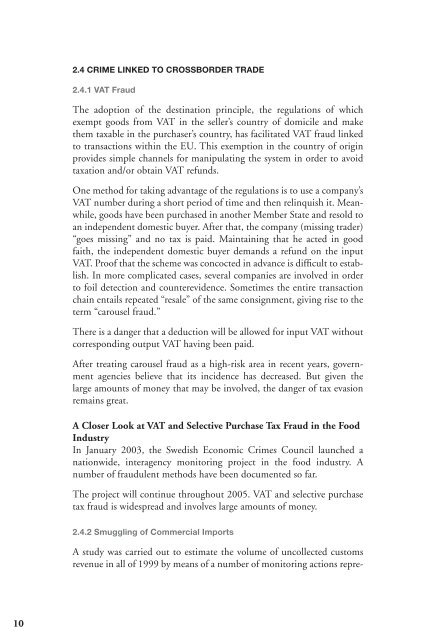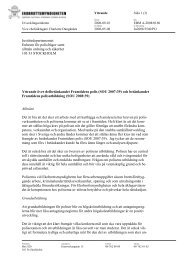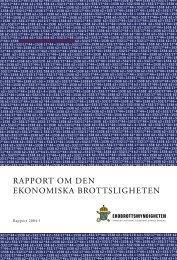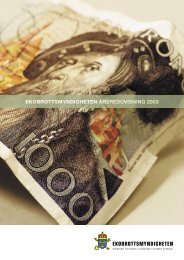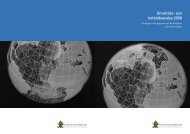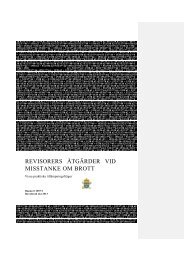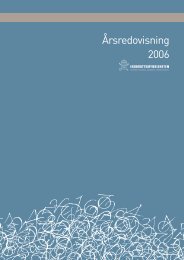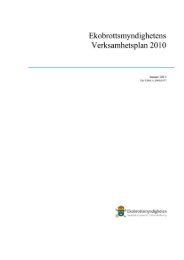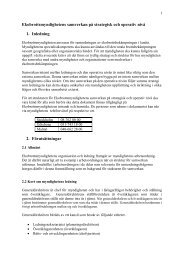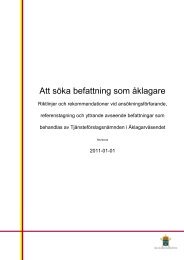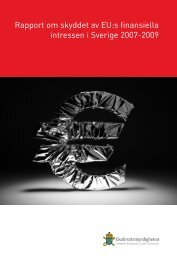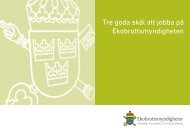Economic crime report 2004 - Ekobrottsmyndigheten
Economic crime report 2004 - Ekobrottsmyndigheten
Economic crime report 2004 - Ekobrottsmyndigheten
You also want an ePaper? Increase the reach of your titles
YUMPU automatically turns print PDFs into web optimized ePapers that Google loves.
2.4 CRIME LINKED TO CROSSBORDER TRADE<br />
2.4.1 VAT Fraud<br />
The adoption of the destination principle, the regulations of which<br />
exempt goods from VAT in the seller’s country of domicile and make<br />
them taxable in the purchaser’s country, has facilitated VAT fraud linked<br />
to transactions within the EU. This exemption in the country of origin<br />
provides simple channels for manipulating the system in order to avoid<br />
taxation and/or obtain VAT refunds.<br />
One method for taking advantage of the regulations is to use a company’s<br />
VAT number during a short period of time and then relinquish it. Meanwhile,<br />
goods have been purchased in another Member State and resold to<br />
an independent domestic buyer. After that, the company (missing trader)<br />
“goes missing” and no tax is paid. Maintaining that he acted in good<br />
faith, the independent domestic buyer demands a refund on the input<br />
VAT. Proof that the scheme was concocted in advance is difficult to establish.<br />
In more complicated cases, several companies are involved in order<br />
to foil detection and counterevidence. Sometimes the entire transaction<br />
chain entails repeated “resale” of the same consignment, giving rise to the<br />
term “carousel fraud.”<br />
There is a danger that a deduction will be allowed for input VAT without<br />
corresponding output VAT having been paid.<br />
After treating carousel fraud as a high-risk area in recent years, government<br />
agencies believe that its incidence has decreased. But given the<br />
large amounts of money that may be involved, the danger of tax evasion<br />
remains great.<br />
A Closer Look at VAT and Selective Purchase Tax Fraud in the Food<br />
Industry<br />
In January 2003, the Swedish <strong>Economic</strong> Crimes Council launched a<br />
nationwide, interagency monitoring project in the food industry. A<br />
number of fraudulent methods have been documented so far.<br />
The project will continue throughout 2005. VAT and selective purchase<br />
tax fraud is widespread and involves large amounts of money.<br />
2.4.2 Smuggling of Commercial Imports<br />
A study was carried out to estimate the volume of uncollected customs<br />
revenue in all of 1999 by means of a number of monitoring actions repre-<br />
10


